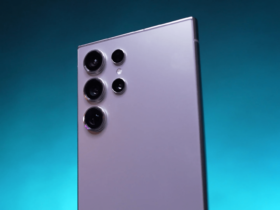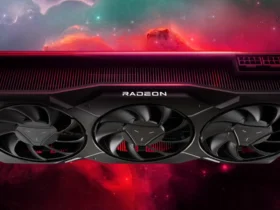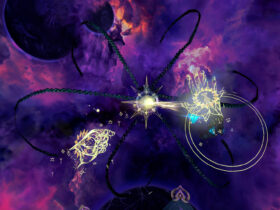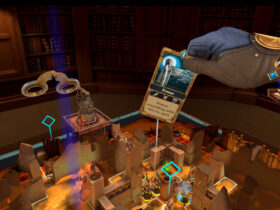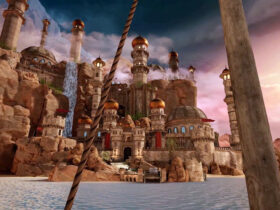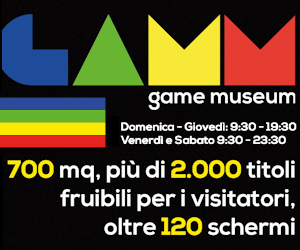In occasion to the Master Class Nuke The Foundry at VIGAMUS, ORI has interviewed the Visual Effects Artist Victor Perez, after trying the Oculus Rift at the Oculus Room in the Museum. A multi talented Spanish film maker, Victor’s skills range from directing, visual effects and editing through to acting and marketing. He began to develop a keen eye for film when he was just six years old when he started to make stop motion animation films by borrowing a camera from his brother, who is a photographer. After seeing Star Wars in the cinema when he was a child, Victor was inspired to explore computer graphics which he became increasingly talented at, so much so that he acquired his first professional job as a graphic designer at the age of 16. Studying acting, his interest in film grew when he received a role in the feature film Summer Rain, directed by Antonio Banderas. Victor then focused his attention on the film industry and worked in post production, editing and visual effects. Victor’s credits as a VFX artist include 127 Hours, Pirates of the Caribbean, Harry Potter and the Deathly Hallows, Dark Knight Rises, working with the Academy Award winning team on Inception and Bourne Legacy amongst others. He is a member of the Visual Effects Society and gives master classes worldwide in Nuke(TM) compositing, color theory, VFX for film makers and regularly publishes on Nukepedia, the most important resource for film compositing worldwide.
[youtube id=”oyvcMdW0ED4″ width=”600″ height=”350″]
M: Special Guest for the Master class Nuke The Foundry, we are here with the Visual Effects Artist Victor Perez, who has tried for the first time Oculus Rift. On the technical side, what are your impressions on the VR HMD Oculus Rift?
Well for a point of view is something total new, that is not conventional for 88his being this immersive in video games. The possibility of having the stereoschopic device just strict to your eyes, responding just one by one to your movements is quite interesting, because is giving you the impression of being there. Leaving aside the quality of the graphics or the level of accuracy with the controls, it is really interesting the new perspective that this thing is opening now in the market. So, the first thing is something totally new, never seen before because the theme of the latency, so the response between your movements and the program executing that movement is quite impressive. So that is avoid in a lot of the progress of sickness of the motion, because you feel naturally integrated in the video game, so it has been really positive for me.
M: Which Rift applications do you expect for cinema?
Well, for cinema I have no ideas. I’m sure there are many people now thinking about how to integrate it. During the last years everything is merging towards the immersion in cinema, thinking about I-Max screens, where everything is big, covering your whole visual, of course the stereoschopy, that is giving you the third dimension. It’s not only that now, everything is now in your head, letterally, so, when you are moving your head, you now can see things that are not in a single window. Narrative, a new way of storytelling that is quite interesting because you are not focusing, that is a good thing but not as so good for storytelling because it’s going to be different to tell a story but you can be in the middle of the set. For instance, if you are telling a story you can be, I don’t know, in a coffee shop and the characters can be next to you in another table, you can be sitting next to them. You are not an observer anymore, now you are part of it. Maybe there is something happening behind you, you can just turn and see another scene. So, it is going to chance of course and for sure the concept of the space, is not a window anymore. And that’s a nice thing.
M: Considering the development of visual effects, how do you think Oculus Rift could be used for your specifical activity?
Weel, in my concrete field maybe it is not being right now (maybe because I’ve just tried it, so I didn’t had the time to think about all the applications), but I can see that maybe not only because of the Rift, but also because of the development of real time rendering they are using, it can have a new animation cinema. Because in live action is just tricky just to get everything mapped, you are going to need that crazy group of cameras just to film everything and then recreate the full space, it’s going to be kind of strange in a certain way. But in animation we are talking about a new feel, because everything has to be generated, you don’t need to capture the reality, you are recreating that reality. So, not right now in visual effects but for animation cinema, you can create a new space and being inside that space. So, everything is on the conception of the space and on how you relate to that space. Maybe in the direct application of effects itself is not going to make a lot of difference. For a visual effect artist we need to be in the window. But for a procedural approche like animation or the video game (now there are video game that are rendered as films), but in the future stade when Oculus is going to be released to the general audience, it’s going to change the rules of course of how we percieve the cinema.
M: Trying Oculus Rift, how can you describe your experience?
In one word: immersive. you are inside, you are not “looking at”. One of the software I tried, even if the graphics was really low resolution because it was just testing demo, the feeling of those monster being there, in the horror scenario, was very scaring, creating tension inside you. Something important that I consider is one of the keys of the gyroscope inside the Rift. It is not only responsive to the rotation of your read, but also the the movement of your head. So, I just discovered myself scared to death. I was not using my hands to look around the corner, I was moving my head. Then I asked myself “hey, what are you doing?” For a second, even for me that I’ve been working with computer all my life, I was trying to get the wall with my hands. Is really impressive how precise can take that. The level of precision is the key point. Is not the wii experience, is not replicated anything, is just you feel inside. The sense of movement is strange. In the rollercoaster, when you are going down, you feel the gravity and the centriphugal force. At the beginning you don’t understand what’s going on, but right after a few minutes, your body starts to response and to understand it’s a game. It’s really interesting how your body reacts. I believe it’s like the sickness. For gamers maybe it’s not so a strong feeling. After a few minutes you forget to have something in your face: the visor is not so heavy, and maybe in the future will be even smaller and lighter, less invasive.Nnow you feel wearing a mask, but i’m sure one day, maybe very near, you will wear just glasses. This is just a prototype, so I guess they are working on it. but yes, leaving aside the hardware, I think the software and the response are just great.
M: Before today in the Oculus Room, have you ever heard about Oculus Rift?
To be honest, I knew this technology, I have never tried it. I never considered that this thing could this responsive. Everybody as seen film with the virtual reality, but we know that this is something belonging to films and fiction. When you put this thing in your face, you’re like “Oh, this is happening!” So, no, I never expected this happening this fast, maybe it was 10 years ago when I saw a film with virtual reality, we’re talking about The Matrix in a certain sense, you know? For me this thing is something new, I don’t know is also for the market, but I should knew about this thing, for sure, because it is very interesting.
M: Cinema and Video games are the most popular Arts in this Century. In the even more powerful connections between the two Arts, which will be in your oprinion the role of the Oculus Rift?
That’s interesting. For a long time video games have been trying to look like films and now we are in a time where films are looking like video games. But it seems like each others wants to be different but they look just the same. Everything is tenting to be more immersive. Video games are miming the reality, with all the natural effects and cinematography. There is a real direction of photography in video games, with the study of lenses, of the lights, but now we are in a new territory, we are now exploring new things. I don’t know if it will create a crossover between them, if they are going to use the same levels of immersion. Maybe it’s going to be for both a way to tell stories. The technology is just the same now, in films we are using technologies coming from video games. Video game is now a big industry, even bigger than cinema, it has been the little brother, but now has become the “big brother”. That is nice in a certain sense but is dangerous for a different development just to get maybe the cinema trying to do the same of video games. The question is, why should I do the same of video games if I have the video games to do that? Now it’s a moment of mix and mess of technologies and storytelling techniques that needs just to be separate and find what is the best place way to proceed. Of course in video games the Rift is going to be like a killer, even for mobile displays. If I want to watch a movie, I don’t want to be in a little iphone or in a little ipad: with this i will have like 10 meters square of screen quite behind my eyes. For sure many people right now are inventing things about that. It’s like the iphone at the beginning: a few applications and than, after 2 years, millions. So, it’s going to be like that, for sure.
Clicca sulla copertina per leggere









